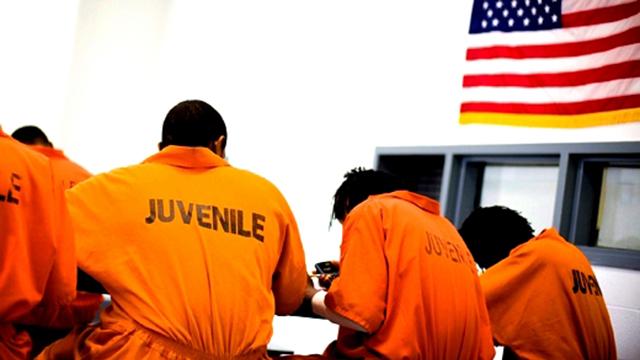
It used to be that getting in a schoolyard fight meant a trip to the principal’s office—detention, maybe. But in Florida, more than any other state, that schoolyard fight can lead to the student’s arrest and even felony charges. Last year 12,000 students were arrested 13,870 times in Florida public schools, the Orlando Sentinel reported. The arrests are meted out unevenly. Black students are just 21 percent of Florida youth, but make up 46 percent of all school-related referrals to law enforcement, according to the Sun Sentinel.
The majority of the arrests, 67 percent, were for infractions like fist fights, dress-code violations, and talking back—schoolyard misbehavior that, in Florida and elsewhere, increasingly results in misdemeanor criminal charges. “The vast majority of children being arrested in schools are not committing criminal acts,” Wansley Walters, secretary of the Florida Department of Juvenile Justice, told the Orlando Sentinel.
While Florida is not alone in turning to police to discipline young people, it has the distinction of being the nation’s leader in school-based arrests. Last year, Florida produced the highest documented number of school-based arrests in the country—and that number was an improvement over previous years. In 2005, Florida made 28,000 arrests in school. It has logged a 39 percent drop in school arrests over the last seven years, according to the Department of Juvenile Justice.
In most cases, 69 percent, the juvenile justice system ultimately dismisses or otherwise diverts the charges. But experts say getting hauled away from school in handcuffs nonetheless has a lifelong impact.
David Utter, director of the Florida Youth Initiative at the Southern Poverty Law Center, notes that getting arrested is, at a basic psychological level, a “highly traumatic” experience for young people. It can precipitate the breakdown in trust between young people and the adults in their lives, making what should be a welcoming and nurturing environment a hostile place.
The arrests also carry more measurable costs. Even when the arrest doesn’t go anywhere because, say, the state chooses to drop the case, a child is forever forced to answer affirmatively when asked on job and other applications whether they’ve ever been arrested. Statutes allow a child to have his or her record expunged, but expungements are not automatic, said Utter, and the state still holds onto personal data about a child. “It’s pretty damn permanent,” Utter said.
Convictions are even more damaging. Convicted felons are not allowed to vote in Florida, and are barred from accessing certain benefits like housing or higher education grants, said Alana Greer, a staff attorney at the Advancement Project.
School-based arrests are a byproduct of the growing role of police in schools, a trend that’s developed alongside the rise of so-called “zero-tolerance” school discipline policies since the 1980s. The policies, using language borrowed from the war on drugs, demand swift and harsh punishments as a response to disciplinary infractions. Many observers worry that as school-based shootings shock the country, schools will see a further escalation of zero-tolerance policies and a concordant influx of police in schools. Last month, President Obama unveiled a multi-pronged plan to prevent future school-based shootings. As part of his school security plan, Obama called for more therapists, social workers, counselors—and police officers.
Those police officers, who are not trained in adolescent development, are increasingly being called on to fill a role that school counselors, teachers and other adults used to fill, said Greer. “Disciplinarians are so overwhelmed so much of the time, and there’s someone down the hall who can make the situation go away,” Greer said, “But that person happens to have a badge, a gun and handcuffs.”
“We’ve lost sight of common-sense discipline,” she said.
Florida is not alone in its zealous use of arrests as a disciplinary response, or in its racially disparate application of school-based arrests. More than 68 percent of youth go to U.S. schools with a police officer assigned to their campus. When police officers are around, what they tend to do is arrest kids, juvenile justice advocates have lamented. Late last year the Department of Justice sued Meridian, Miss., for running a school-to-prison pipeline which ushered a disproportionate number of black students out of school and straight into the waiting arms of the juvenile justice system.
But more police don’t necessarily improve school climates. The American Psychological Association’s sweeping 2006 review found that zero-tolerance policies aren’t effective tools for discouraging misbehavior. Nor do they make schools safer. “While the intentions of putting those police officers in schools is good, they come with an extraordinary number of unintended consequences,” said Lara Herscovitch, a senior policy analyst with the Connecticut Juvenile Justice Alliance.
In Florida, where Walters’ Department of Juvenile Justice has committed to reducing the rate of school-based arrests by 10 percent this year, the situation is still urgent. Even with recent improvements, the percent of those arrested for petty misdemeanors “hasn’t budged,” Utter said. “While it’s a good thing that fewer children are being arrested, we’re still arresting kids for utter bullshit.”
Groups like the Southern Poverty Law Center and the Advancement Project, along with local affiliates like the Florida NAACP in Broward County are working with educators, law enforcement and school administrators to address the arresting spree.
But for all the recent improvements, the post-Newtown talk of ramping up school security via more police has advocates on watch. Herscovitch says that especially in this post-Newtown climate, when the impulse is to send even more police officers to schools, juvenile justice and school safety advocates “are working very hard to make sure that the response to Newtown doesn’t create another 10 to 20 years of consequences.”
3 WAYS TO SHOW YOUR SUPPORT
- Log in to post comments















